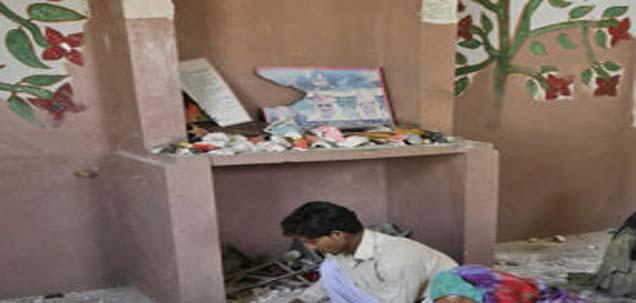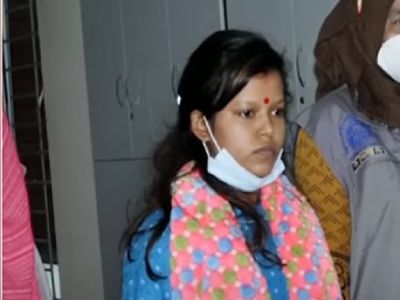Kartik Shuklapaksha 1, Kaliyug Varsha 5114
 |
Karachi : They came after dusk and chanted into the night sky "Kill the Hindus", as they smashed religious icons, ripped golden bangles off women’s arms and flashed pistols.
It wasn’t the first time that the Hindu temple on the outskirts of Pakistan’s largest city was attacked, and residents here fear it will not be the last.
"People don’t consider us as equal citizens. They beat us whenever they want," said Mol Chand, one of the teenage boys gathered at the temple. "We have no place to worship now."
It was the second time the Sri Krishna Ram temple has been attacked, and this time the mob didn’t even bother to disguise their faces.
The small temple, surrounded by a stone wall, is a tiny religious outpost in a dusty, hardscrabble neighbourhood so far on the outskirts of the city that a sign on the main road wishes people leaving Karachi a good journey.
Local Muslim residents blamed people from a nearby ethnic Pashtun village for the attack, which took place in late September on the Day of Love for the Prophet, a national holiday declared by the government in response to an anti-Islam film made in the US. No one was seriously injured in the attack.
It was the latest in a rising tide of violence and discrimination against Hindus in this 95 percent Muslim country, where Islamic extremism is growing.
Pakistan’s Hindu community says it faces forced conversions of Hindu girls to Islam, a lack of legal recognition for their marriages, discrimination in services and physical abuse when they venture into the streets. The story of the Hindu population in Pakistan is one of long decline.
During partition in 1947, the violent separation of Pakistan and India into separate countries, hundreds of thousands of Hindus opted to migrate to India where Hinduism is the dominant religion.
Those that remained and their descendants now make up a tiny fraction of Pakistan’s estimated 190 million citizens, and are mostly concentrated in Sindh province in the southern part of the country.
Source : Daily Bhaskar

 Pakistani Hindus express their happiness, thank PM Modi after receiving Indian citizenship under CAA
Pakistani Hindus express their happiness, thank PM Modi after receiving Indian citizenship under CAA MHA issues first set of citizenship certificates under CAA to 14 applicants
MHA issues first set of citizenship certificates under CAA to 14 applicants Bangladesh: Hindu girl sentenced to 5 years in jail over accusation of ‘blasphemy’
Bangladesh: Hindu girl sentenced to 5 years in jail over accusation of ‘blasphemy’ Dehradun: Ahtasam and Sahil rape 2 Hindu minor sisters after entrapping them in love affair
Dehradun: Ahtasam and Sahil rape 2 Hindu minor sisters after entrapping them in love affair PFI formed death squads to kill Hindus after they murdered RSS leader Rudresh: NIA investigation
PFI formed death squads to kill Hindus after they murdered RSS leader Rudresh: NIA investigation Conspiracy to kill Hindu leaders: Shakil Sheikh arrested from Maharashtra by Surat Police
Conspiracy to kill Hindu leaders: Shakil Sheikh arrested from Maharashtra by Surat Police